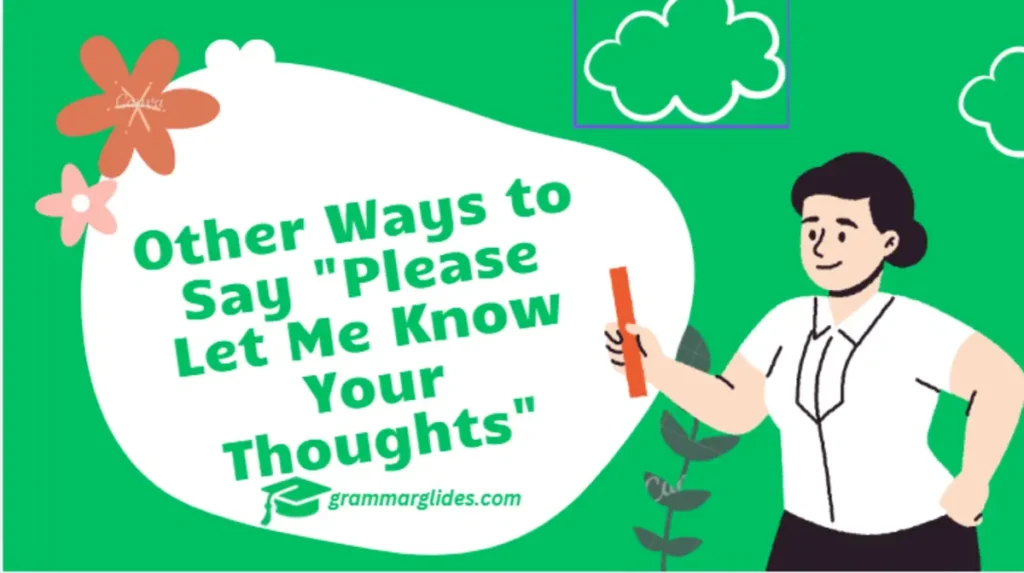“ Alternative phrases to say “please let me know your thoughts.”
Asking for someone’s opinion is an essential part of communication, whether in professional or personal contexts. The phrase “please let me know your thoughts” is commonly used, but it can sometimes feel repetitive or formal.
Fortunately, there are many alternative expressions that can convey the same message while adding a fresh touch to your conversation. In this blog post, we will explore 30 unique phrases to ask for feedback or opinions, complete with scenarios, examples, and explanations for each.
1. I’d Love to Hear Your Opinion
Scenario: You’ve shared a new idea with your team.
Example 1: “I’d love to hear your opinion on this proposal.”
Example 2: “Please share your thoughts; I’d love to hear your opinion.”
Explanation: This phrase expresses genuine interest in the other person’s view, making it more engaging.
2. What Do You Think?

Scenario: You’re discussing a project update with a colleague.
Example 1: “What do you think about the changes we made?”
Example 2: “I’d like to know what you think of this strategy.”
Explanation: This direct question invites feedback in a casual manner, making the conversation feel more open.
3. I’m Curious to Know Your Thoughts
Scenario: You’re presenting a new product idea to a friend.
Example 1: “I’m curious to know your thoughts on this concept.”
Example 2: “I’m curious; what are your thoughts on the design?”
Explanation: This phrase shows that you value the other person’s input and are interested in their perspective.
4. Please Share Your Insights
Scenario: After a meeting, you want feedback on the discussion.
Example 1: “Please share your insights about today’s meeting.”
Example 2: “I’d appreciate it if you could share your insights on the project.”
Explanation: This phrase adds a sense of professionalism and encourages deeper analysis from the other person.
5. I’d Appreciate Your Feedback
Scenario: You’ve completed a draft of a report.
Example 1: “I’d appreciate your feedback on this report before I finalize it.”
Example 2: “Could you review it? I’d appreciate your feedback.”
Explanation: This polite request emphasizes that you value the other person’s opinion and want their input.
6. What Are Your Thoughts?
Scenario: You’re brainstorming ideas with a friend.
Example 1: “What are your thoughts on our travel plans?”
Example 2: “I’m eager to hear what your thoughts are on this!”
Explanation: This simple phrase is straightforward and encourages open dialogue.
7. Let Me Know What You Think
Scenario: You’re asking a coworker about a presentation you delivered.
Example 1: “Let me know what you think about my presentation.”
Example 2: “I’m looking forward to hearing from you. Let me know what you think!”
Explanation: This casual expression invites immediate feedback without pressure.
8. I Welcome Your Thoughts
Scenario: You’ve drafted a new marketing plan.
Example 1: “I welcome your thoughts on this marketing strategy.”
Example 2: “Your perspective is important; I welcome your thoughts.”
Explanation: This phrase conveys respect for the other person’s opinion and invites them to share.
9. Your Input Would Be Helpful
Scenario: You’re seeking feedback on a project timeline.
Example 1: “Your input would be helpful as I finalize the schedule.”
Example 2: “I’d love to hear your ideas; your input would be helpful.”
Explanation: This expression highlights the value of the other person’s contribution to the matter at hand.
10. Please Give Me Your Take
Scenario: You’re discussing a movie with a friend.
Example 1: “Please give me your take on that film we saw.”
Example 2: “I’d love to hear your take on the ending.”
Explanation: This informal request invites a personal opinion and makes the conversation feel relaxed.
11. I’d Like Your Perspective
Scenario: You’re working on a team project.
Example 1: “I’d like your perspective on this approach.”
Example 2: “Can you share your perspective on how we can improve?”
Explanation: This phrase encourages thoughtful input, emphasizing that the person’s viewpoint is valued.
12. What’s Your Take?

Scenario: You’ve tried a new restaurant and want feedback.
Example 1: “What’s your take on the food we had?”
Example 2: “I’m curious, what’s your take on the service?”
Explanation: This casual expression invites a quick and informal response.
13. I Value Your Opinion
Scenario: After discussing a sensitive topic, you seek feedback.
Example 1: “I value your opinion on this matter.”
Example 2: “Your thoughts are important; I value your opinion.”
Explanation: This phrase expresses admiration for the other person’s judgment, encouraging them to share.
14. Feel Free to Share Your Thoughts
Scenario: You’re asking for feedback on a draft.
Example 1: “Feel free to share your thoughts on my draft.”
Example 2: “I’m open to ideas; feel free to share your thoughts.”
Explanation: This casual invitation makes it clear that you welcome any input they may have.
15. I’m Open to Your Suggestions

Scenario: You’re looking for input on an event plan.
Example 1: “I’m open to your suggestions for the party.”
Example 2: “Please let me know; I’m open to your suggestions.”
Explanation: This phrase emphasizes that you are receptive to the other person’s ideas.
16. Please Weigh In
Scenario: You’re discussing a work decision with a team.
Example 1: “Please weigh in on this proposal.”
Example 2: “I’d like everyone to weigh in with their thoughts.”
Explanation: This expression invites everyone to contribute their opinions to the discussion.
17. I’m Eager to Hear Your Feedback
Scenario: You’ve implemented changes in a project.
Example 1: “I’m eager to hear your feedback on these changes.”
Example 2: “Your feedback is valuable; I’m eager to hear it.”
Explanation: This phrase conveys enthusiasm about receiving input from the other person.
Other Ways to Say “Good Morning”
18. What’s Your Opinion?
Scenario: You’ve designed a new logo.
Example 1: “What’s your opinion on the new logo?”
Example 2: “I’d love to know what’s your opinion about the design.”
Explanation: This straightforward question encourages honest feedback.
19. Let’s Discuss Your Thoughts
Scenario: You’ve shared an article with a friend.
Example 1: “Let’s discuss your thoughts on that article.”
Example 2: “I’d love to hear you; let’s discuss your thoughts!”
Explanation: This phrase promotes dialogue and suggests a more in-depth conversation.
20. Can I Get Your Thoughts?

Scenario: You’re exploring new ideas with colleagues.
Example 1: “Can I get your thoughts on this concept?”
Example 2: “I would love it if I could get your thoughts.”
Explanation: This informal phrase encourages feedback in a friendly way.
21. I’d Love Your Feedback
Scenario: You’ve created a presentation.
Example 1: “I’d love your feedback before I present it.”
Example 2: “If you could review it, I’d love your feedback.”
Explanation: This phrase emphasizes appreciation for the other person’s opinion.
22. What Are Your Ideas?
Scenario: You’re brainstorming with a team.
Example 1: “What are your ideas for improving the project?”
Example 2: “Please share; what are your ideas on our strategy?”
Explanation: This open-ended question invites creative input.
23. Let Me Know How You Feel
Scenario: You’ve made changes to a team plan.
Example 1: “Let me know how you feel about the new plan.”
Example 2: “I’d appreciate it if you could let me know how you feel.”
Explanation: This phrase emphasizes emotional response, making it more personal.
24. I’d Appreciate Your Take
Scenario: You’re considering a new business venture.
Example 1: “I’d appreciate your take on this opportunity.”
Example 2: “Can you give me your take? I’d appreciate it.”
Explanation: This phrase encourages thoughtful feedback on a specific topic.
25. Your Thoughts Would Be Valuable
Scenario: You’re seeking feedback on a draft.
Example 1: “Your thoughts would be valuable in refining this.”
Example 2: “I’d like to know; your thoughts would be valuable.”
Explanation: This expression emphasizes the significance of the other person’s input.
26. Can I Get Your Input?
Scenario: You’re discussing potential improvements in a project.
Example 1: “Can I get your input on our next steps?”
Example 2: “I’m interested in hearing; can I get your input?”
Explanation: This straightforward question encourages active participation.
27. I’m Interested in Your Feedback

Scenario: You’re reviewing a team’s performance.
Example 1: “I’m interested in your feedback on the last project.”
Example 2: “Please share; I’m interested in your feedback.”
Explanation: This phrase shows genuine curiosity about the other person’s views.
28. Share Your Thoughts With Me
Scenario: You’re looking for opinions on a product.
Example 1: “Please share your thoughts with me on this product.”
Example 2: “I’m curious; share your thoughts with me!”
Explanation: This direct request encourages a straightforward response.
29. Let’s Hear Your Ideas
Scenario: You’re organizing a team brainstorming session.
Example 1: “Let’s hear your ideas for the new campaign.”
Example 2: “Everyone’s welcome; let’s hear your ideas!”
Explanation: This phrase fosters an inclusive environment for sharing opinions.
30. What Do You Feel About This?
Scenario: You’ve made a proposal at work.
Example 1: “What do you feel about this proposal?”
Example 2: “I’d love to know; what do you feel about our direction?”
Explanation: This phrase invites emotional feedback, making it more personal and engaging.
Conclusion
Using alternative phrases for “please let me know your thoughts” can enrich your conversations and help you connect more deeply with others. By varying your language, you can encourage more meaningful dialogue and foster an atmosphere of open communication. The expressions outlined in this post can be tailored to different contexts, ensuring that your request for feedback is both polite and effective.

Hi! I’m Zadie-Smith, the author of Grammar Glides. I create easy-to-follow resources to help you master English grammar with confidence. Join me on my website for tips and tools to make your English learning journey smooth and enjoyable!

